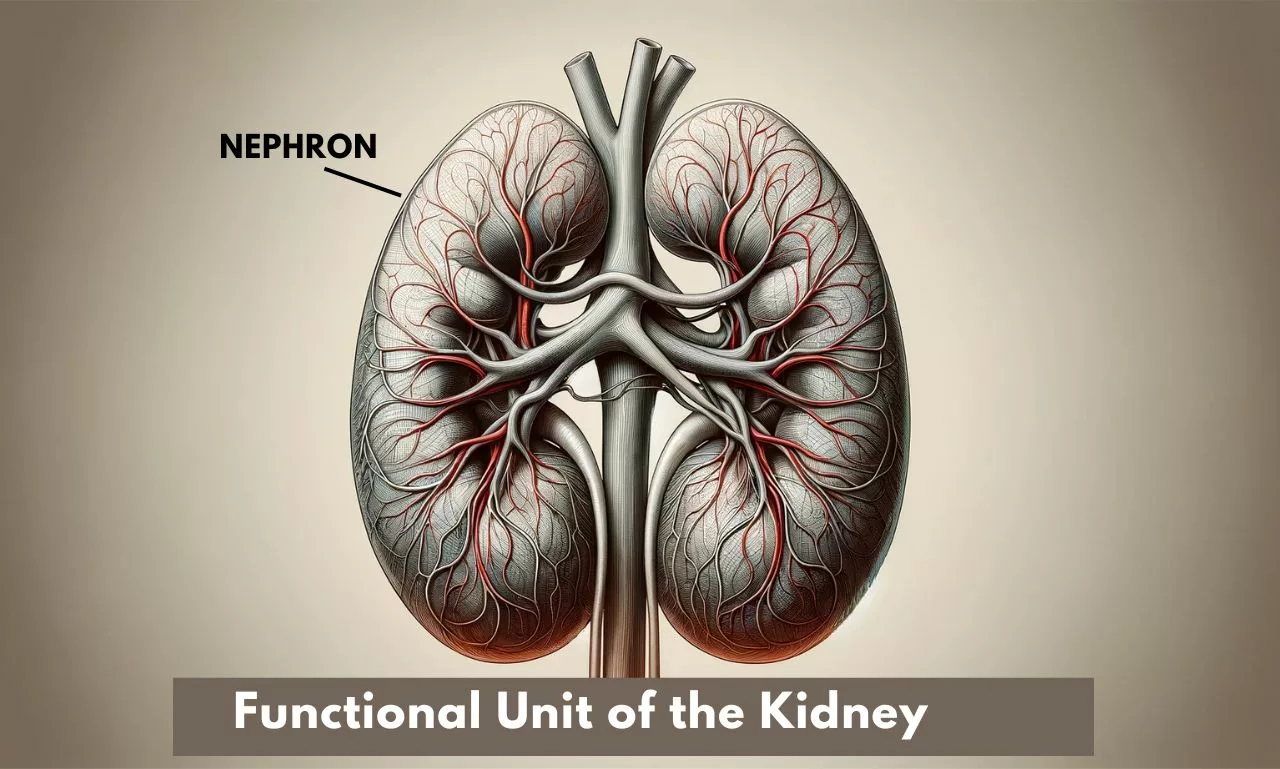The kidneys are vital organs in the human body, primarily responsible for filtering and removing waste products and excess fluids from the blood through urine production. This helps maintain a stable balance of body salts and minerals. At the heart of this complex process is the nephron, the functional unit of the kidney. Understanding how nephrons work is key to comprehending how the kidneys function overall. In this article, we’ll explore the nephron’s structure, function, and role in kidney health in a step-by-step manner.
Table of Contents
Step 1: Introduction to the Nephron
A nephron serves as the fundamental building block and operational unit of the kidney. Each human kidney contains around 1 million nephrons, which work collectively to filter blood and produce urine. A nephron is composed of two main structures: the glomerulus and the renal tubule.
Step 2: The Glomerulus – The Filtration Site
- Location and Structure: The glomerulus is a tiny ball-shaped cluster of capillaries located at the beginning of each nephron. It is surrounded by a cup-shaped structure called Bowman’s capsule.
- Function: The principal role of the glomerulus is blood filtration. Blood is channeled into the glomerulus via the afferent arteriole and exits through the efferent arteriole. The high pressure in the glomerulus forces water and solutes out of the blood and into the Bowman’s capsule, starting the process of urine formation.
Step 3: The Renal Tubule – Processing the Filtrate
The renal tubule is a long, coiled tube that extends from the Bowman’s capsule and is divided into several sections:
- Proximal Convoluted Tubule (PCT): The PCT reabsorbs water, ions, and valuable nutrients from the filtrate back into the blood. It also secretes substances like hydrogen and creatinine into the filtrate.
- Loop of Henle: This U-shaped section has a descending limb that further concentrates the filtrate by allowing water to be reabsorbed into the blood. The ascending limb pumps salts out to maintain a high salt concentration in the surrounding tissue, which is crucial for water reabsorption.
- Distal Convoluted Tubule (DCT): The DCT fine-tunes the process by further reabsorbing sodium and calcium ions and secreting potassium and hydrogen ions, under the influence of hormones like aldosterone and parathyroid hormone.
- Collecting Duct: Multiple nephrons feed into a collecting duct, which carries the final urine to the renal pelvis. The collecting duct plays a crucial role in maintaining the body’s water and salt balance by adjusting the urine’s concentration under the influence of antidiuretic hormone (ADH).
Step 4: The Role of Nephrons in Kidney Health
Nephrons are integral to the kidneys’ ability to perform their functions effectively. They not only filter waste and excess substances from the blood but also help regulate blood pressure, electrolyte balance, and red blood cell production through the secretion of the hormone erythropoietin.
Step 5: Implications for Health
Damage to nephrons can impair kidney function, leading to conditions such as chronic kidney disease (CKD) and acute kidney injury (AKI). Diabetes and high blood pressure are common causes of nephron damage. Maintaining healthy nephrons is crucial for overall kidney health and function.
Conclusion
The nephron is the cornerstone of kidney function, playing a critical role in filtering blood, maintaining fluid and electrolyte balance, and regulating blood pressure. Understanding the structure and function of nephrons provides valuable insights into how kidneys maintain homeostasis and highlights the importance of kidney health in overall well-being.
Frequently Asked Questions (FAQs)
Q1: What exactly does a nephron do in the kidney?
A1: A nephron filters blood to remove waste products and excess substances, regulates blood pressure, maintains electrolyte balance, and controls the body’s fluid balance. It performs these tasks through its two main structures, the glomerulus (for filtration) and the renal tubule (for reabsorption and secretion).
Q2: How many nephrons are in a human kidney?
A2: Each human kidney contains approximately 1 million nephrons. They work collectively to filter blood and produce urine.
Q3: Can nephrons regenerate or repair themselves after being damaged?
A3: Unlike some cells in the body, nephrons do not regenerate. Once they are damaged, the remaining nephrons can adapt to take on more work, but the overall function of the kidney can be compromised if too many nephrons are lost.
Q4: What are the main causes of nephron damage?
A4: The main causes of nephron damage include diabetes, high blood pressure, chronic kidney infections, and certain toxins or medications. Uncontrolled diabetes and high blood pressure are particularly harmful as they can lead to chronic kidney disease.
Q5: How can I keep my nephrons healthy?
A5: To keep your nephrons healthy, maintain a balanced diet, stay hydrated, exercise regularly, manage chronic conditions like diabetes and hypertension, avoid smoking, and limit exposure to toxins and harmful medications. Regular check-ups with your healthcare provider can also help detect and manage potential kidney issues early.
Q6: What happens when nephrons stop working?
A6: When nephrons stop working, waste products, fluids, and electrolytes can build up in the body, leading to various health issues like swelling, high blood pressure, and electrolyte imbalances. Severe or widespread nephron damage can lead to kidney failure, requiring dialysis or kidney transplantation.
Q7: Are there any symptoms of nephron damage?
A7: Early stages of nephron damage may not show obvious symptoms. As the condition progresses, symptoms like fatigue, swelling in legs and feet, decreased urine output, and difficulty sleeping may appear. Regular screening for kidney function, especially in individuals at risk, is crucial for early detection
Q8: Can lifestyle changes improve nephron function?
A8: While lifestyle changes cannot reverse damage to nephrons, they can help slow the progression of kidney disease and reduce the risk of further damage. This includes controlling blood pressure and blood sugar levels, eating a kidney-friendly diet, and avoiding substances that can harm the kidneys.
